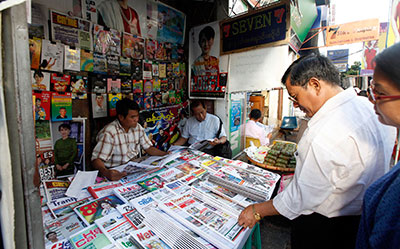New York, December 28, 2012–Burmese authorities’ decision to allow private daily newspapers to resume publication is a welcome change to a policy that has stifled press freedom in the country for decades, the Committee to Protect Journalists said today.
The Information Ministry announced today that any Burmese citizen wanting to start a daily newspaper could submit an application starting in February, and that the new publications, printed in any language, would begin appearing on newsstands on April 1, according to news reports. The move is part of a series of new press reforms President Thein Sein has introduced since taking office in March 2011.
“If fully enacted and with no restrictions, the new policy would effectively reverse many of the anti-media policies that have lingered since President Thein Sein’s civilian government came to power last year,” said Bob Dietz, CPJ’s Asia program coordinator.
All of the private dailies in Burma were forced to shut down in 1964 when Ne Win, the former dictator, nationalized private businesses, according to news reports. Since then, authorities have allowed the publication of state-run dailies, but have permitted only about 180 weeklies to publish, CPJ research shows. The weeklies, which must submit their content to the government-run censorship body for review before publication, focus mainly on non-controversial stories, like sports or entertainment.
Earlier this year, CPJ noted that although the government abolished pre-publication censorship, allowed coverage of previously banned topics, and freed at least 12 imprisoned journalists, the country still did not have a free press. The Burmese government pledged in August to dismantle its Press Scrutiny and Registration Division, but the censorship body remained in place. Authorities also continue to deny visas to most international journalists.
Exile-run media, like the news outlet Irrawaddy, have often supplied critical coverage of issues the government has tried to suppress. In September 2011, CPJ issued a special report, “In Burma, transition neglects press freedom,” which documented the great risks faced by critical exile-run media.
- For more data and analysis on Burma, visit CPJ’s Burma page here.
